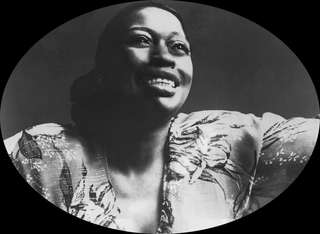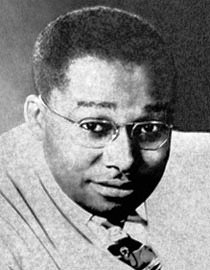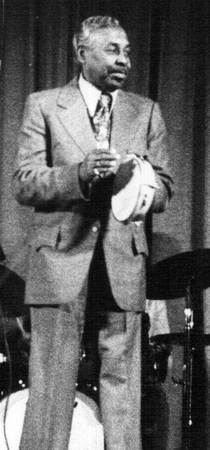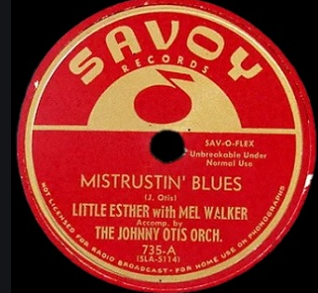Related Research Articles
Rhythm and blues, frequently abbreviated as R&B or R'n'B, is a genre of popular music that originated in African-American communities in the 1940s. The term was originally used by record companies to describe recordings marketed predominantly to urban African Americans, at a time when "urbane, rocking, jazz based music ... [with a] heavy, insistent beat" was becoming more popular. In the commercial rhythm and blues music typical of the 1950s through the 1970s, the bands usually consisted of a piano, one or two guitars, bass, drums, one or more saxophones, and sometimes background vocalists. R&B lyrical themes often encapsulate the African-American experience of pain and the quest for freedom and joy, as well as triumphs and failures in terms of relationships, economics, and aspirations.

Johnny Otis was an American singer, musician, composer, bandleader, record producer, and talent scout. He was a seminal influence on American R&B and rock and roll. He discovered numerous artists early in their careers who went on to become highly successful in their own right, including Little Esther Phillips, Etta James, Alan O'Day, Big Mama Thornton, Johnny Ace, Jackie Wilson, Little Willie John, Hank Ballard, and The Robins, among many others. Otis has been called the "Godfather of Rhythm and Blues".

Myron Carlton "Tiny" Bradshaw was an American jazz and rhythm and blues bandleader, singer, composer, pianist, and drummer. His biggest hit was "Well Oh Well" in 1950, and the following year he recorded "The Train Kept A-Rollin'", important to the development of rock and roll; he co-wrote and sang on both records.
Paul "Hucklebuck" Williams was an American jazz and blues saxophonist, bandleader, and songwriter. His record "The Huckle-Buck", recorded in December 1948, was one of the most successful R&B records of the time. In his Honkers and Shouters, Arnold Shaw credited Williams as one of the first to employ the honking tenor saxophone solo that became the hallmark of rhythm and blues and rock and roll in the 1950s and early 1960s.

Johnny Shuggie Otis is an American singer-songwriter, recording artist, and multi-instrumentalist.
Cecil James "Big Jay" McNeely was an American rhythm and blues saxophonist.

Esther Phillips was an American singer, best known for her R&B vocals. She rose to prominence in 1950, scoring several major R&B hits including "Double Crossing Blues" and "Mistrustin' Blues" under the moniker "Little Esther". In the 1960s, she achieved chart success with the country song "Release Me" and recorded in the pop, jazz, blues and soul genres. Phillips received a Grammy nomination for her single "Home Is Where the Hatred Is" in 1973 and her disco recording of "What a Diff'rence a Day Makes" was a major hit in 1975. She died from liver and kidney failure due to long-term drug abuse in 1984.

Joseph Christopher Liggins, Jr. was an American R&B, jazz and blues pianist and vocalist who led Joe Liggins and his Honeydrippers in the 1940s and 1950s. His band appeared often on the Billboard magazine charts. The band's biggest hit was "The Honeydripper", released in 1945. Joe Liggins was the older brother of R&B performer Jimmy Liggins.

Vann "Piano Man" Walls was an American rhythm and blues piano player, songwriter, studio musician and professional recording artist. He was a long-standing session player for Atlantic Records, appearing on hits by artists including Big Joe Turner, Ruth Brown and The Clovers. Walls performed under a number of different names and is variously credited as Van Walls, Harry Van Walls and Captain Van. He led the Harry Van Walls Orchestra and also performed with Doc Starkes and His Nite Riders and as Le Capitaine Van.

Bobby Marchan was an American rhythm and blues singer, songwriter, recording artist, bandleader, MC, and female impersonator. He was the key singer in the early lineup of Huey "Piano" Smith and the Clowns along with Gerri Hall and Roosevelt Wright.
The Bihari brothers, Lester, Jules, Saul and Joe, were American businessmen of Hungarian Jewish origins. They were the founders of Modern Records in Los Angeles and its subsidiaries, such as Meteor Records, based in Memphis. The Bihari brothers were significant figures in the process that transformed rhythm and blues into rock and roll, which appealed to white audiences in the 1950s.

Roy Bunny Milton was an American R&B and jump blues singer, drummer and bandleader.
Malvin Lightsy, known professionally as Mel Walker, was an American R&B singer best known for his recordings in the early 1950s as lead male singer with the Johnny Otis Orchestra.
Leon René was an American music composer of pop, R&B and rock and roll songs and a record producer in the 1930s, 1940s, and 1950s. He sometimes used the songwriting pseudonym Jimmy Thomas or Jimmie Thomas. He also established several record labels.

"Cupid" is a song by American singer Sam Cooke, released on May 16, 1961. It charted at number 17 on the Billboard Hot 100 and number 20 on the Hot R&B Sides chart; the track performed best in the United Kingdom, peaking at number seven on the UK Singles Chart. Cooke's producers had asked him to write a song for a girl they had seen on a Perry Como TV show—but once they heard her sing, they kept "Cupid" for Cooke himself.
"Double Crossing Blues" is a 1950 song by the Johnny Otis Quintette, the Robins, and Little Esther. It was released as a 78-rpm single (731-A) by Savoy Records in 1950. The single went to number one on the US Billboard R&B chart.

"Mistrustin' Blues" is a song written by Johnny Otis. It was sung by Little Esther and Mel Walker, accompanied by The Johnny Otis Orchestra, and released on the Savoy label. The record was the second collaboration between Johnny Otis and Little Esther. "Mistrustin Blues" was their second number one record on the R&B chart, which it topped for four weeks. It was ranked No. 10 on Billboard magazine's year-end list of R&B records for 1950 based on sales.

Henry Bernard Glover was an American songwriter, arranger, record producer and trumpet player. In the music industry of the time, Glover was one of the most successful and influential black executives. He gained eminence in the late 1940s, primarily working for the independent King label. His duties included operating as a producer, arranger, songwriter, engineer, trumpet player, talent scout, A&R man, studio constructor, while later in his career he became an owner of his own label. Glover worked with country, blues, R&B, pop, rock, and jazz musicians, and he helped King Records to become one of the largest independent labels of its time. Thanks to the efforts of family, friends and fans, Glover's hometown of Hot Springs, Arkansas celebrated the 100th anniversary of his birth in 2021 by inducting him into the downtown "Walk of Fame," the Mayor's "Proclamation," "Key to the City," and named a parklet "Henry Glover Way," along Black Broadway after him. In 2018, Glover was recognized with a Lifetime Achievement Award by the King Records 75th Anniversary. In 2013, he was inducted into the Blues Hall of Fame.
Willie E. Jackson Jr., known as Little Willie Jackson, was an American jazz and rhythm and blues saxophonist, bandleader and occasional vocalist.
References
- ↑ Billboard - Volume 83 1971 -- Page 28 In 1949 Johnny and Esther moved over to the Savoy label and had 3 smash hit with "Double Crossin' Blues" and followed it up with a booting "Cupid's Boogie" in 1950. In 1952 Otis folded things up for a while and Esther went out on her own ...
- ↑ Brian Ward - Just My Soul Responding: Rhythm and Blues, Black Consciousness, and ...0520212983 1998 "According to Los Angeles r&b bandleader Johnny Otis, Bandstand was at heart "an anti-Negro set up". Otis was a truly seminal ... among many others. In the 1950s, Otis recorded such hits as "Cupid's boogie" and "Willie and the hand-jive" .."